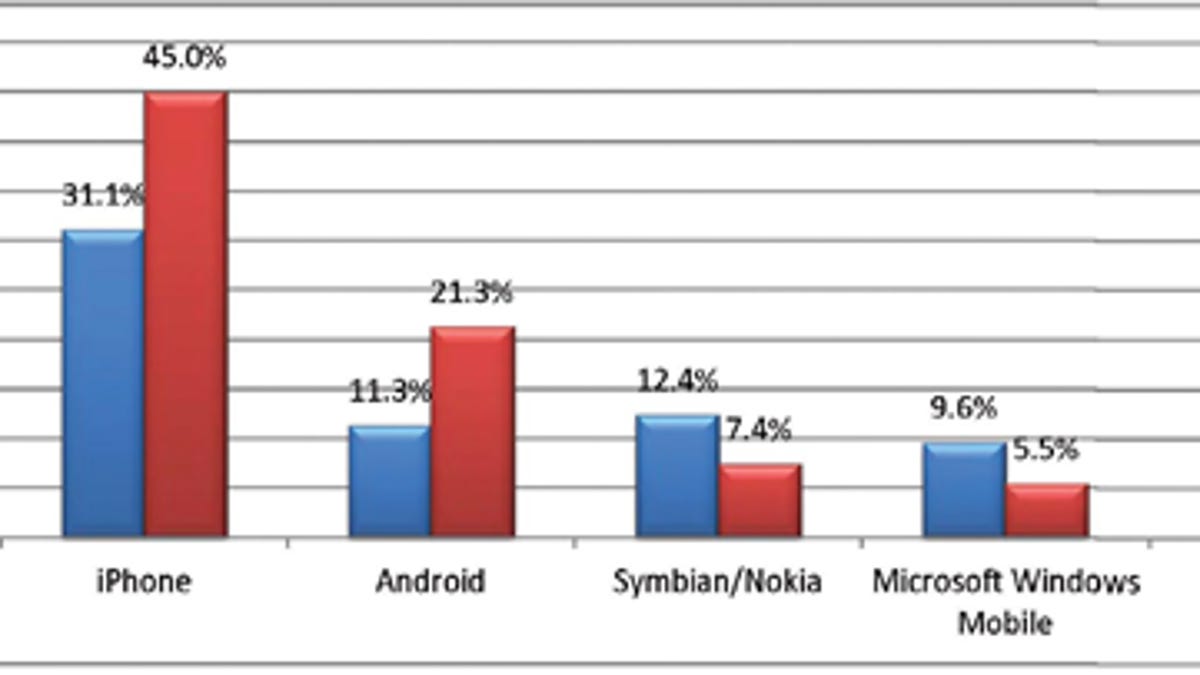iPhone more popular than BlackBerry for business users
An iPass poll finds that Apple's flagship phone has captured a 45-percent share of mobile enterprise workers, surpassing RIM's BlackBerry with a 32-percent share.

The iPhone has surpassed the BlackBerry in capturing the hearts and minds of business users, at least according to one survey.
Polling more than than 2,300 enterprise workers for its latest quarterly Mobile Workforce Report, iPass found the iPhone tops among the mobile business crowd with a 45-percent share. That proved to be a healthy jump from 2010 when the iPhone's share was only 31 percent.
Dropping to second place was the BlackBerry with a 32-percent share, slightly lower than the 35 percent seen last year. That left Android in the No. 3 spot with a 21 percent share among those polled, surpassing Nokia's Symbian platform.
BlackBerry's descent is not necessarily a sign that RIM has grown out of favor in the enterprise, according to iPass, but more the fact that competing mobile platforms have quickly risen in popularity.
"While increasing iPhone usage in the workplace was inevitable, this is the tipping point when the iPhone has overcome the BlackBerry on its traditional enterprise turf, and business smartphones are in the hands of nearly every knowledge worker," iPass President and CEO Evan Kaplan said in a statement.
Looking ahead to next year, the iPhone will continue to shine among the enterprise crowd, while BlackBerry may sink further. Asked which smartphones they plan to purchase in 2012, 18 percent pointed to the iPhone, 11.2 percent to an Android device, 3.6 percent to Microsoft's Windows Phone device, and only 2.3 percent to a BlackBerry.
The range of smartphones now available has also opened more choices for business users, leading to greater adoption. Among those polled, 95 percent have smartphones, up from 85 percent last year. A full 91 percent use smartphones for work. And 42 percent use their own personal phones on the job as more companies increasingly support or allow "bring your own device" policies, iPass noted.
Further, smartphones are no longer used just by workers who need to travel. Rather, they're considered a necessary tool by all employees who want to stay connected.
"Today's mobile employees are critical to the success of every enterprise, contributing 240 more work hours a year than their non-mobile counterparts," Kaplan added. "Connectivity is essential because work is no longer where you go but what you do."
On the downside, the report found that more smartphone users are giving up sleep and exercise to stay connected to their companies. One in three of those polled said they sleep less because of work, while more than half said they exercise occasionally or not at all, with 60 percent of those pinning the blame on work.
More than half of the workers surveyed (59 percent) feel an emotional bond with their smartphones as many of them they would feel disoriented, distraught, or even lonely going without a smartphone for a week.
The 2,300 workers polled came from more than 1,100 enterprise companies around the world, with 49 percent from North America, 32 percent from Europe, and 12 percent from the Asia/Pacific region. The survey was conducted between September 27 and October 26.

